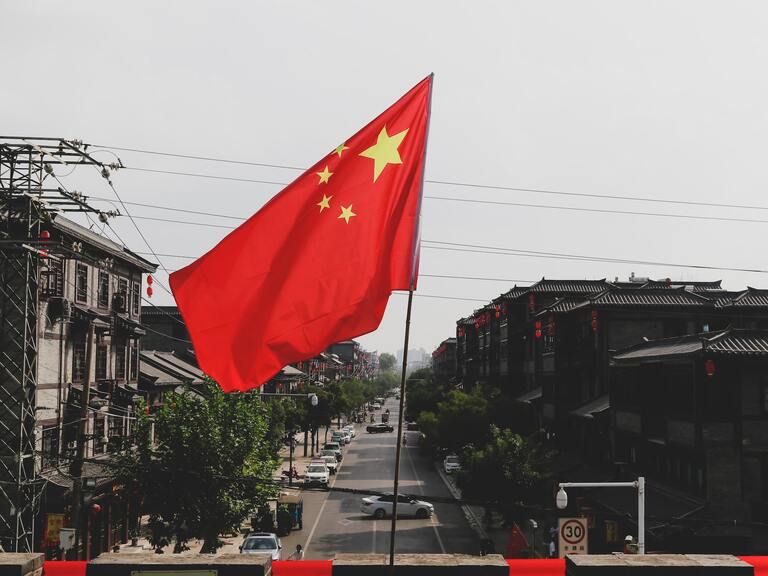An Anatomy of Turkish Foreign Policy: 1995 – 2020, Issue #6: Turkey & China
Introduction
This study is the sixth bilateral analysis of Turkish Foreign Policy (TFP) in the research project titled: “An Anatomy of Turkish Foreign Policy.” Our goal is to quantify TFP’s evolution between 1995 and 2020 through a data-driven account free of speculative remarks. In this analysis, we will focus on the development of Turkey’s bilateral relations with China. In doing so, we will begin with a quantitative analysis of the relations to provide an overview. Next, we will survey the notable events between the two countries that impacted bilateral relations.
The Data
We use data from the publicly available Lockheed Martin Advanced Technology Lab’s Integrated Crisis Early Warning System (ICEWS) event database in the present analysis. We discuss the methodology in Issue #1 of this series.[1] In brief, ICEWS features information on directed dyadic interactions between countries (i.e., Turkey-China), where each observation includes details of who (source) did what (action) to whom (target), when (time), and where (location). Each interaction is then assigned an intensity score that ranges between -10 and +10 based on the category of the interaction. Negative interaction intensity scores imply conflict, and positive interaction intensity scores indicate cooperation. We calculate monthly and annual averages of the intensity scores to form indices.
Turkey-China Relations: An Overview
How frequently does Turkey interact with China, and what is the nature of its interactions? In Issue #1, we present a list of Turkey’s top interaction partners. The interaction frequency between Turkey and China increased gradually over time. The aggregate interaction frequency suggests that the total is the 18th highest between January 1st, 1995, and April 30th, 2020. ICEWS features 2,430 observations with China within this timeframe, of which 225 are unique interactions.[2] This number corresponds to about one and a half percent of Turkey’s total interactions of 186,255. Table 3.1 below compares the summary statistics of Turkey’s directed dyadic interaction intensity scores with China and the rest of the World.

The summary statistics in Table 3.1 provides a good overview of the overall interactions’ essence. The higher average intensity score of 2.29 between Turkey and China compared to the 1.34 between Turkey and the World suggests that Turkey’s relations with China vis-à-vis the World were, on average, more cooperative. This difference can also be qualitatively captured by exploring the shapes of the distributions. Figure 3.1 and Figure 3.2 below are event intensity score distributions. In both distributions, any value to the left of 0 suggests a conflictual interaction and to the right suggests a cooperative interaction. We also include the results of a simple difference-in-means test in Table 3.2, which indicates a statistically significant difference in the average intensity of interactions towards China compared to the World.
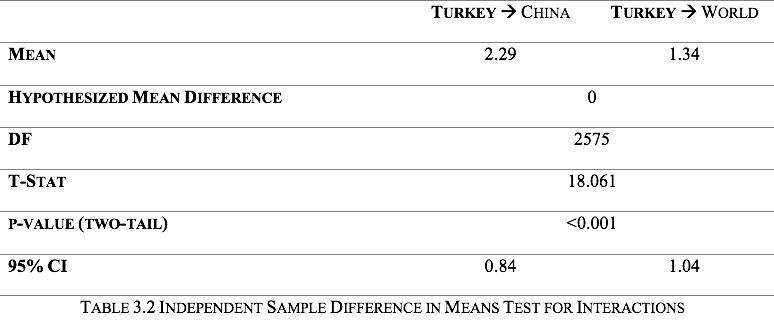
Looking at the relations between Turkey and China exclusively, the summary statistics from Table 3.1 suggest the cooperation between the two countries was slightly more than instances of conflict, given the negative skewness in the data’s distribution.
What was the variation in the frequency of bilateral interactions over time? Figure 3.3 below demonstrates the frequency of both cooperation and conflict initiations by Turkey toward China by year. It should be noted that this figure does not consider the magnitude of cooperation or conflict. The figure suggests the presence of two phases. The high frequency of cooperation marks the first phase between 1995 and 2010. The second phase, which spans 2010 and onwards, features a balanced ratio of conflict and cooperation initiations. The series of events that particularly stood out during this time related to the FD-2000 missile system deal.
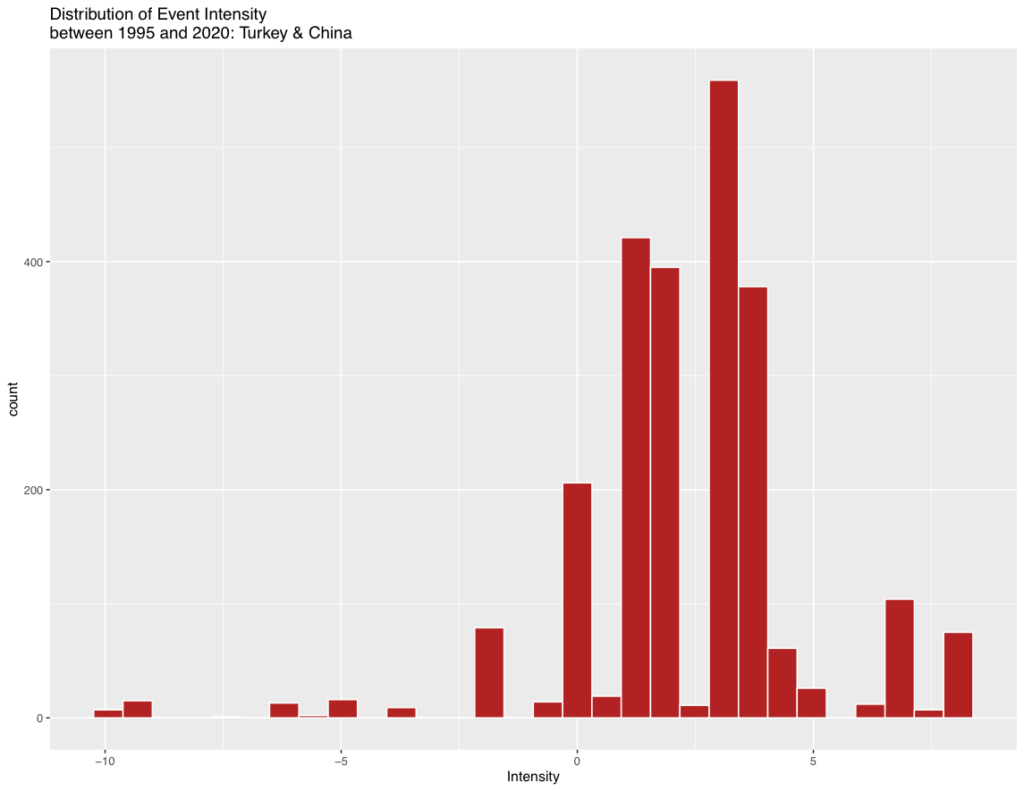
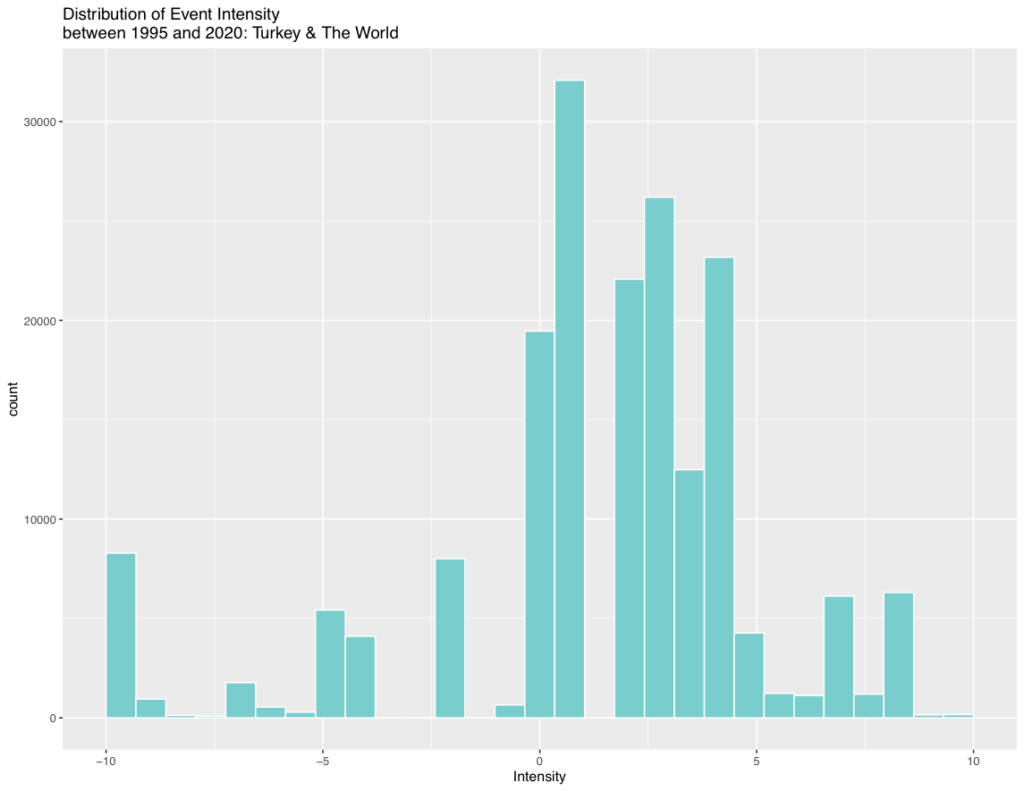
The disaggregation of interaction frequency by intensity over time provides further information. Figure 3.4 demonstrates the annual distributions of interactions. The distribution at the bottom displays the values for 1995 and the one at the top for 2020. As always, while 0 marks neutral events, any interactions that are located to the right of 0 are classified as instances of cooperation, and to the left are instances of conflict. The magnitude of interaction intensity increases as it approaches the minimum and maximum values (10 and -10). The figure remains steady overall, with slight leftward shifts since 2010. The year with the most discernable conflict initiation is 2013, which relates to the missile deal. Figure 3.5 demonstrates the variation in relations during a given government.[3] The intensity and frequency of interactions with China are at their highest during the 57th, 59th, and 60th governments. The interactions decrease following the 60th and pick up during the 66th.
States actively react to signals they receive from their counterparts and adjust their foreign policy towards them. An index can be particularly useful for understanding the overall evolution of the signals in bilateral relations. Our most noteworthy contribution in this report is the index of bilateral relations between Turkey and China. We present the index in In Figure 3.6.
To draw our overall dyadic relations index, we begin with calculating a simple monthly intensity average of all interactions for a given month. The values of these averages are displayed with the black dots in Figure 3.6. A dot above zero suggests that the interactions for the month were cooperative, and a dot below suggests otherwise.
Next, we move on to the trendlines. An upward-pointing trendline suggests an improvement in the bilateral relations and an increase in cooperation, whereas a downward-pointing trendline suggests growing discord. We first focus on the short-term trends and calculate a six-month moving average. This line shows the average intensity scores considering the preceding six months and is displayed with the red line in Figure 3.6. This trendline describes the short-term cascades in which the two countries interact with each other. Finally, we turn to the long-term and fit a non-parametric locally weighted smoothing line among all the monthly averages, which is displayed with the blue line in Figure 3.6. The grey band around the blue line shows the 95% confidence intervals. This line captures the trend in the long-term evolution of bilateral relations between Turkey and China. Overall, the line suggests a stable and cooperative tone between the two countries, with a slight yet observable decline following 2013.
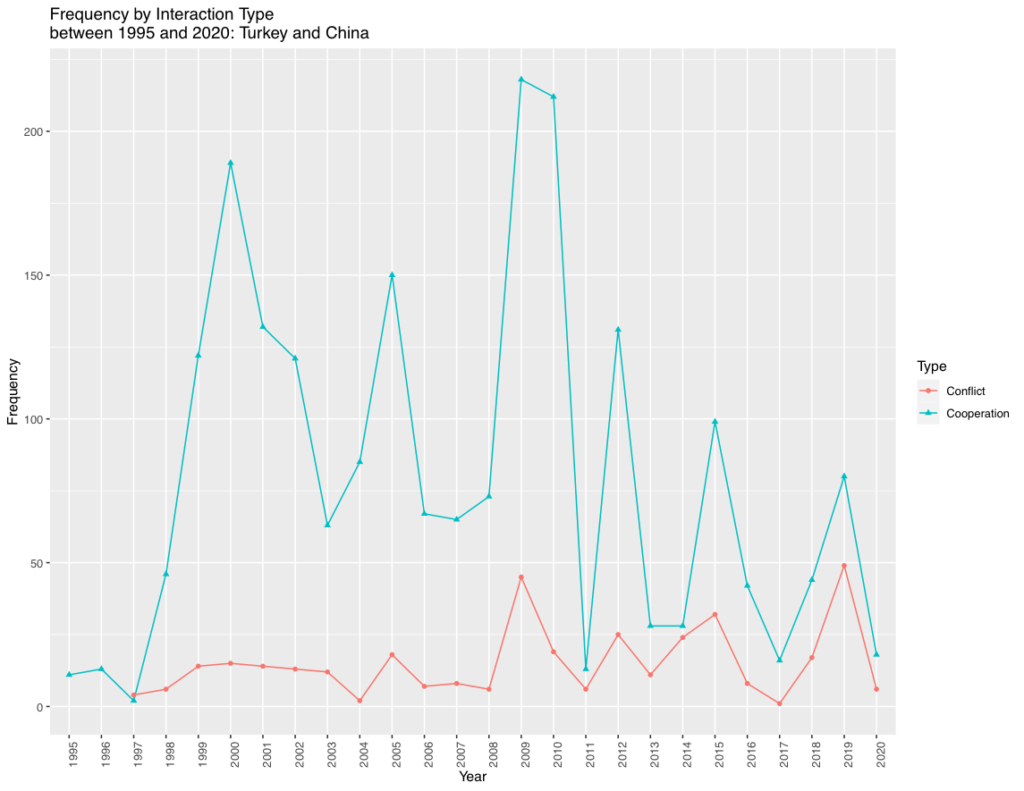
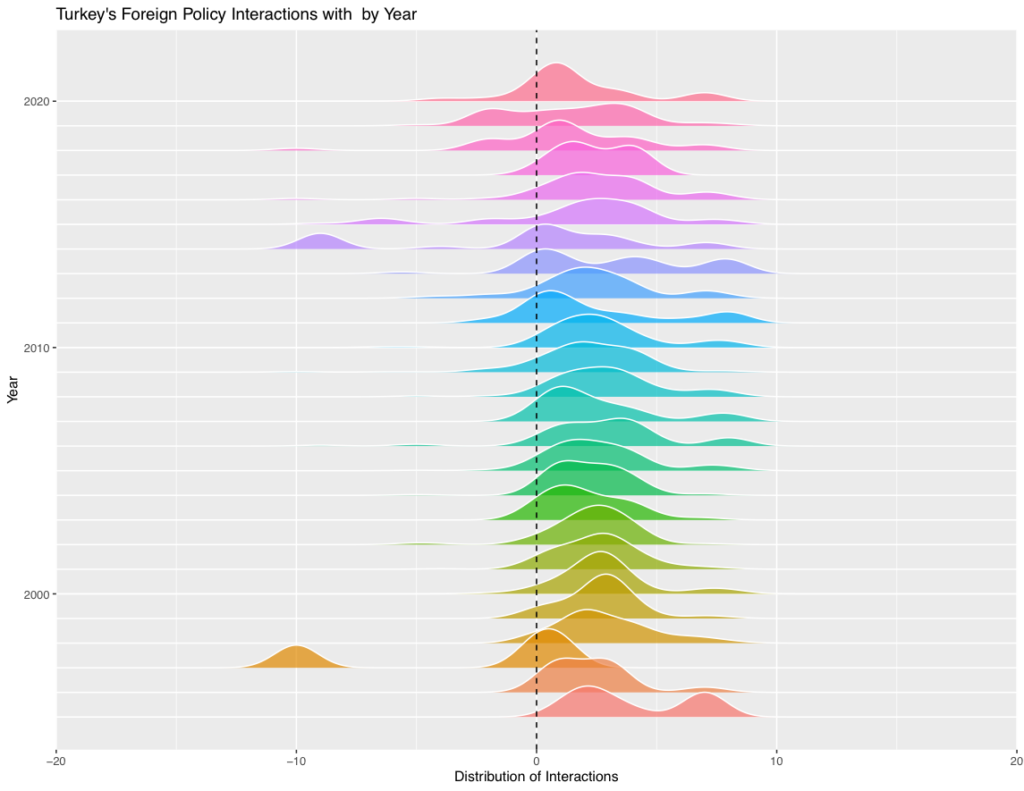
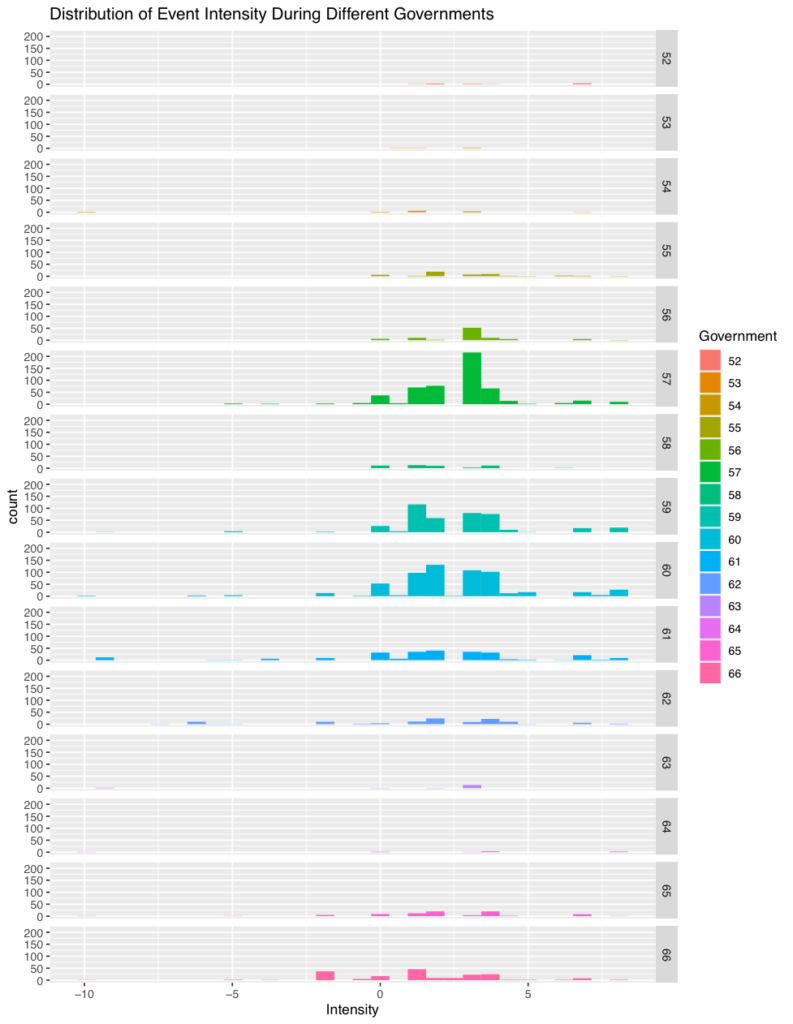
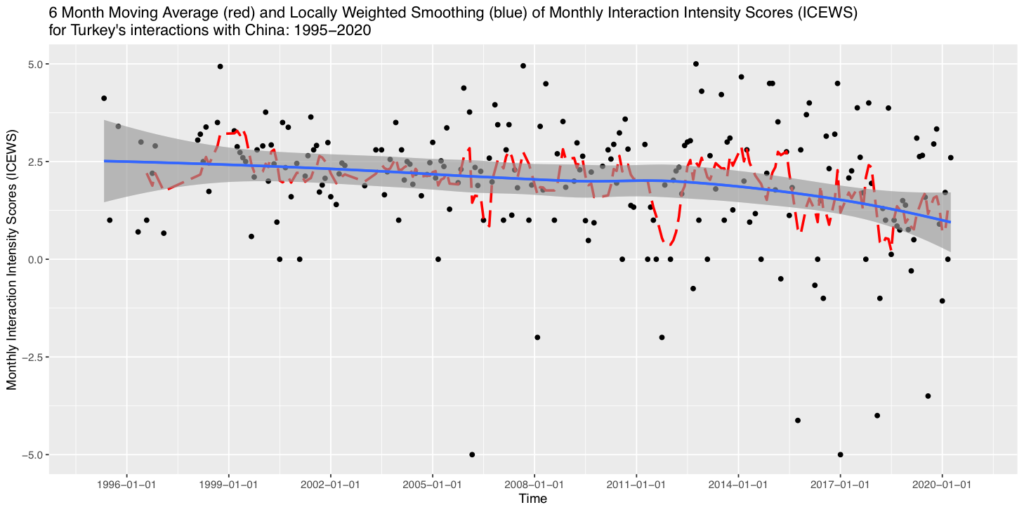
Defining Moment in Turkey-China Relations
What are the momentous events that defined the relations between Turkey and China? In this section, we focus on the milestones that defined the bilateral relations within the past two and a half decades between the two countries. We use the ICEWS intensity variable for filtering individual milestone interactions.
President Demirel’s Asia Tour, 24 May 1995
Turkish President Suleyman Demirel organized an Asia tour to improve diplomatic and economic ties with China and Hong Kong. This foreign policy was pursued to strengthen Turkey’s position in the ongoing regional disputes and conflicts in Bosnia-Herzegovina, Nagorno-Karabakh, and Cyprus [Source: Serpil Cevikcan ve Umit Bektas, “Demirel Yasak Kenti gezdi”, Milliyet, 24 May 1995.]
Chinese Ambassador Protests Istanbul Mayor Erdogan, 7 August 1995
Chinese Ambassador to Ankara Wu Keming issued a protest to Mayor of Istanbul Metropolitan Municipality Recep Tayyip Erdogan due to his decision to name a public park in Istanbul after Isa Yusuf Alptekin, who is a political figure in the Uyghur dispute. Due to China’s diplomatic pressures, the Turkish Ministry of Affairs decided to rename the park. [Source: Orhan Tokatli, “Tayyip Erdogan’a ÇİN Protestosu”, Milliyet, 7 August 1995.]
China’s President Hosts Turkey’s Deputy Prime Minister, 2 May 1998
Deputy Prime Minister Bulent Ecevit discussed opportunities for economic cooperation with President Jiang Zemin in Beijing. [Source: “Turkiye’ye Turkistan Uyarisi”, Radikal, 2 May 1998.]
Cooperation on Counterterrorism, February 2000
A cooperation agreement on security and counterterrorism, titled “Agreement on Cooperation between the People’s Republic of China and the Republic of Turkey in Combating Cross-border Criminal Activities,” was signed by Turkey and China. [Source]
Chief of General Staff General Visits China, June 2001
Chief of General Staff General Huseyin Kivrikoglu paid a visit to China to improve military cooperation between Turkey and China. [Source]
China’s Premier Zhu Rongji Visits Turkey, June 2002
Premier Zhu Rongji visited Turkey’s Prime Minister Bulent Ecevit to sign four different economic agreements to enlarge trade volume between the two countries. Ecevit underlined that he would like to see more Chinese investment in Turkey and more tourists from China visiting the country. [Source]
Chinese People’s Armed Police Units Hosts Turkish Counterparts, June 2005
General Fevzi Turkeri, Commander of the Turkish Gendarmerie, visited China in June 2005 upon the invitation of the General Command of the Chinese People’s Armed Police Units. During the visit, the two sides decided to intensify communication and cooperation in fighting crime and terrorism. [Source]
Turkish Air Force Hosts Chinese Counterparts, 18 October 2006
Qiao Qingchen, a member of the People’s Republic of China Central Military Committee and the Commander of the Air Forces, visited his Turkish counterpart Air Forces Commander General Faruk Cömert. Following the meeting, General Faruk Cömert said, “As the Turkish Air Force, we consider that our country will also benefit from these relations. We know that China has made significant breakthroughs, especially in areas where our air force is lacking. The continuation of these relations will benefit both countries.” [Source]
China’s Growing Interest in Turkey’s Mining Industry, 8 May 2008
Tian Hui, Chairman of the Board of Directors of Sinocoal International Engineering Group, China’s largest coal company, stated that they would continue their business activities in Turkey for additional investments in the energy sector. Mining business resources reported that China imported 630 million dollars via mineral imports in 2007, which doubled the previous year’s figure. [Source]
Turkey’s Support for One China Policy, 1 September 2009
Zafer Cağlayan conveyed the message of Turkish Prime Minister Recep Tayyip Erdogan to China’s Prime Minister Wen Jiabao during the meeting, stating that the Turkish government resolutely supports the “One China” policy, recognizes the People’s Republic of China as the only legal government representing all Chinese people, and will not allow anyone to engage in actions that harm China’s sovereignty and territorial integrity on Turkish soil. [Source]
Joint Economic Commission between Turkey and China, 27 September 2009
The Joint Economic Commission Meeting of Turkey and the People’s Republic of China was held in Beijing in order to overcome the problems in trade between the two countries and to develop cooperation. [Source]
Strategic Cooperation Relationship between Turkey and China, 7-9 October 2010
The “Joint Declaration on Establishing and Developing a Strategic Cooperation Relationship Between the Republic of Turkey and the People’s Republic of China” was signed during Prime Minister Wen Jiabao’s visit to Turkey. As a result of the agreement, the relations between the two countries moved to the strategic level. This framework allowed Turkey and China to exchange views on bilateral, regional, and global issues. [Source]
Turkey’s Interest in Shanghai Five Membership, 26 June 2012
Turkish Prime Minister Recep Tayyip Erdogan met with his counterpart, Russian President Vladimir Putin, in Moscow. After the meeting, he noted, “I said to Russian President Vladimir Putin, ‘You tease us, saying what is Turkey doing in the EU?’, now I tease you, include us in the Shanghai Five, and we will abandon the EU.” [Source]
Turkey Year in China, 29 January 2013
Two sides organized mutual “cultural years” between the two countries. In 2012, Turkey China Culture Year was organized with the theme “The Beginning of the Silk Road: Fascinating China.” In 2013, Turkish artists operating in different fields, including cinema and television, ballet and folk dance, handcrafts and fine arts, and traditional and classical music, were introduced to the Chinese people. [Source]
China to Provide Long-Range Missile System to Turkey, 27 September 2013
Turkey’s Undersecretariat for Defense Industries announced a long-range missile systems tender for four billion dollars. Contractors proposed four different systems to Turkey: China’s FD-2000, the US’s Patriot system, Russian S300 missiles, and the Samp-T systems developed by the Italian-French partnership. Turkey’s Undersecretariat for Defense Industries’ executive council announced that the FD-2000 was the final decision. [Source]
Long-Range Missile System Controversy, 29 October 2013
Turkey’s decision to purchase the FD-2000 missile system from CPMIEC, a China-based firm on the USTR sanction list, drew reactions from the US, Russia, France, and Italy, which competed for the sales. On October 1, 2013, NATO Secretary General Anders Rasmussen stated that Chinese missiles would not work in harmony with the NATO system. After the NATO statement, the Turkish Army’s Chief of General Staff, Necdet Ozel, said, “We were not informed of any discomfort from the USA.” [Source]
Merrill Lynch Implements the Necessities of the US Embargo, 5 December 2013
Merrill Lynch announced that it could not act as a consultant in the public offering of ASELSAN, citing Turkey’s choice of the Chinese company for long-range missile systems. In a letter, local sources alleged that Merrill Lynch rejected ASELSAN’s offer and cited Turkey’s selection of a black-listed Chinese company for its long-range missile system. [Source]
Uyghur Congress Endorses Turkish Prime Minister’s Support, 8 August 2014
Rabia Kadir, President of the World Uyghur Congress, said, “Prime Minister Recep Tayyip Erdogan’s government has done what no other government has done; there is no other government in the history of Turkey that has taken care of the Uyghur Turks so much. If someone says, ‘Prime Minister Erdogan did not help the Uyghurs,’ I will stand in front of him as well.” [Source]
China Restates Its Willingness to Sell FD-2000 System, 20 March 2015
China officially announced that Chinese defense contractor CPMIEC won the missile defense system tender launched by Turkey with the FD-2000 system. [Source]
Turkey Announces the Annulation of the Long-range Missile System Tender, 15 October 2015
Turkey canceled the long-range missile tender that was negotiatied with China. Turkish Prime Minister Ahmet Davutoglu announced the cancellation of the approximately $4 billion contract just before the G-20 summit in Antalya. [Source]
Nuclear Energy Cooperation Agreement, 25 August 2016
A cooperation agreement was signed between the governments of Turkey and China on the peaceful use of nuclear energy. [Source]
The Turkey-China Rapprochement, 9 September 2016
President Recep Tayyip Erdogan met with President Xi Jinping of the People’s Republic of China in Hangzhou ahead of the G20 Summit. Turkey and China signed three agreements on energy, nuclear security, and agricultural health certification. President Erdogan said: “While believing that long-term issues like refugees and the fight against terror should remain on the agenda of the G20, I also would like to express our sensitivity to converse about our wish to keep strengthening the developing relations between Turkey and the People’s Republic of China during our talks today.” [Source]
Shanghai Five Bid, 20 November 2016
During a news conference in Ankara, in the Presidential Palace, President Erdogan said, “Why shouldn’t Turkey be in the Shanghai Five? I said this to (Russian President) Mr. Putin, to (Kazakh President) Mr. Nazarbayev, to those who are in the Shanghai Five now.” Erdogan added, “I hope that if there is a positive development there, I think if Turkey were to join the Shanghai Five, it would enable it to act much more easily.” [Source]
On Domestic Currency Cooperation, 5 December 2016
Turkish President Recep Tayyip Erdogan said Turkey could conduct trade in local currencies rather than foreign currencies with Iran, Russia and China. [Source]
The Extradition Agreement, 13 May 2017
The Standing Committee of the National People’s Congress in China announced that it had voted and accepted the “Extradition Agreement” signed between China and Turkey in 2017. Within the framework of this agreement which the Turkish Grand National Assembly has still not officially ratified, the Beijing administration aims to accelerate the deportation of Muslim Uyghurs, that China claims to have committed “terrorist crimes,” especially those who took refuge in Turkey. [Source]
Belt and Road Summit, 15 May 2017
The Baku-Tbilisi-Kars railway line, also defined as the “Middle Corridor” trade, supported by Turkey within the context of its Multilateral Transport Policy, was put into use on October 30, 2017, in Baku with the participation of Turkish President Erdogan. As part of the improving trade relations with China, President Erdogan attended the “Belt and Road Summit,” held in Beijing hosted by Chinese President Xi Jinping. [Source]
On Security Concerns, 3 August 2017
Turkey’s Foreign Minister Mevlüt Çavuşoğlu visited Foreign Minister Wang Yi of the People’s Republic of China in Beijing. During the joint press conference, Çavuşoğlu stated, “We see China’s security as our security, and we do not allow any negative activity against China, either in our country or our region.” [Source]
Endorsement of Turkey – China Relations, 15 June 2018
Foreign Minister Mevlut Cavusoglu said, “There is a 98 percent increase in the number of tourists coming to Turkey from China.” He added that, “2018 is determined as the Year of Turkey Tourism in China.” Minister Cavusoglu underlined, “We discussed the issues of security and the fight against terrorism (with China). In this regard, we will continue to support each other as China and Turkey. Turkey strongly supports the “one China” policy.” [Source]
Congratulatory Visit to Istanbul Mayor, 22 April 2019
China’s Consul General Cui Wei was the first foreign official to visit Istanbul’s newly elected mayor Ekrem Imamoğlu. During the visit, the Mayor underlined the importance of good political and economic relations between Turkey and China. [Source]
On Turkey, India, and China Cooperation, 5 September 2019
Russian President Vladimir Putin evaluated the relations between the G7 and Russia as part of the Eastern Economic Forum held in Vladivostok, Russia. “Turkey, India, and China should be part of a larger entity like the G7,” said Russian President Putin. Putin also indicated that Erdogan asked him why he didn’t bring the issue to the agenda regarding Turkey’s positions in the formation of the G7. [Source]
The First China Railway Express line train reaches Turkey, 7 November 2019
The first Chinese freight train traveling the China Railway Express line from Xi’an, China to Europe crossed under Istanbul’s Bosporus Straits. Infrastructure Minister Cahit Turhan noted that Turkey has become a central link in a “middle corridor”, which extends between Beijing and London as well as the “Iron Silk Road,” a rail track between Turkey and Kazakhstan. [Source]
[iheu_ultimate_oxi id=”24″]
[1] Lautenschlager, Jennifer, Steve Shellman, and Michael Ward. 2015. “ICEWS Event Aggregations.” Harvard Dataverse V3.
[2] Notable events are captured by multiple news agencies leading to repetitions in the dataset.
[3] There are fifteen governments in our timeframe. The terms of these governments are as follows: the 52th Government of Turkey, October 30th, 1995, to March 6th, 1996; the 53th Government of Turkey, March 6th, 1996, to June 28th, 1996; the 54th Government of Turkey, June 28th, 1996, to June 30th, 1997; the 55th Government of Turkey, June 30th, 1997, to January 11th, 1999; the 56th Government of Turkey, January 11th, 1999, to May 28th, 1999; the 57th Government of Turkey, May 28th, 1999, to November 18th, 2002; the 58th Government of Turkey, November 19th, 2002, to March 12th, 2003; the 59th Government of Turkey, March 14th, 2003, to August 29th, 2007; the 60th Government of Turkey, August 29th, 2007, to July 6th, 2011; the 61th Government of Turkey, July 6th, 2011, to August 29th, 2014; the 62th Government of Turkey, August 29th, 2014, to August 28th, 2015; the 63th Government of Turkey, August 28th, 2015, to November 24th, 2015; the 64th Government of Turkey, November 24th, 2015, to May 24th, 2016; the 65th Government of Turkey, May 24th, 2016, to July 9th, 2018; the 66th Government of Turkey, July 10th, 2018 which is ongoing. We include the data for the 51st Government as part of the 52nd Government given its short term.
- This article has been published in cooperation with Friedrich Naumann Foundation.
Photograph: Yan Ke

